Unemployment: Signing on in Cardiff in 2017
- Published
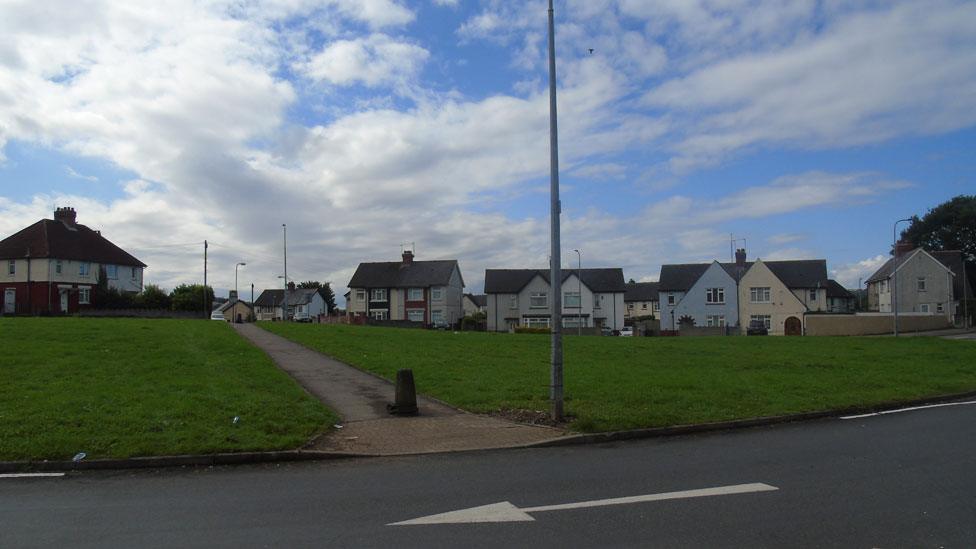
Ely still has Cardiff's highest unemployment rate despite a fall
Unemployment in the UK is at the lowest level since records began in 1975.
But what is it actually like to be out of work in 2017?
Gone are the days of the old fashioned job centres, with boards of vacancies to trawl over.
These days job-seekers are on lap-tops and have to prove they are applying for work before they get any benefits.
Cardiff is seemingly booming with building work across the city and promises of more jobs in the city centre. But there are still parts of the capital which seem miles away.

CARDIFF UNEMPLOYMENT - IN FIGURES
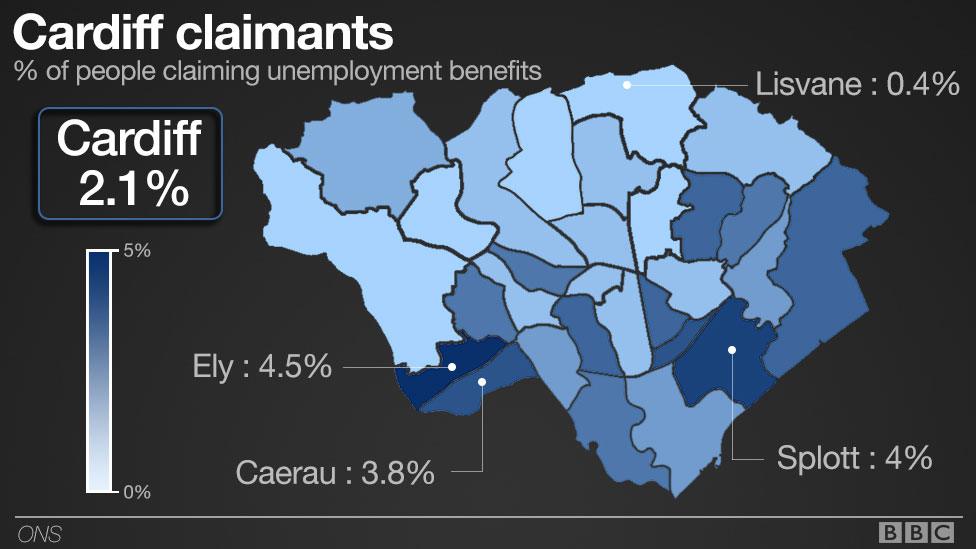
Cardiff's city-wide unemployment claimant rate stands at 2.1% - 1.3% less than it was in 2014.
But this varies depending on where you live in the city.
In Ely, the unemployment claimant rate has fallen from 7.1% to 4.5% in three years - an improvement - but it is still the highest rate in the city.
Figures just released for July show 395 people there are claiming unemployment benefit out of 5,230 across the city.
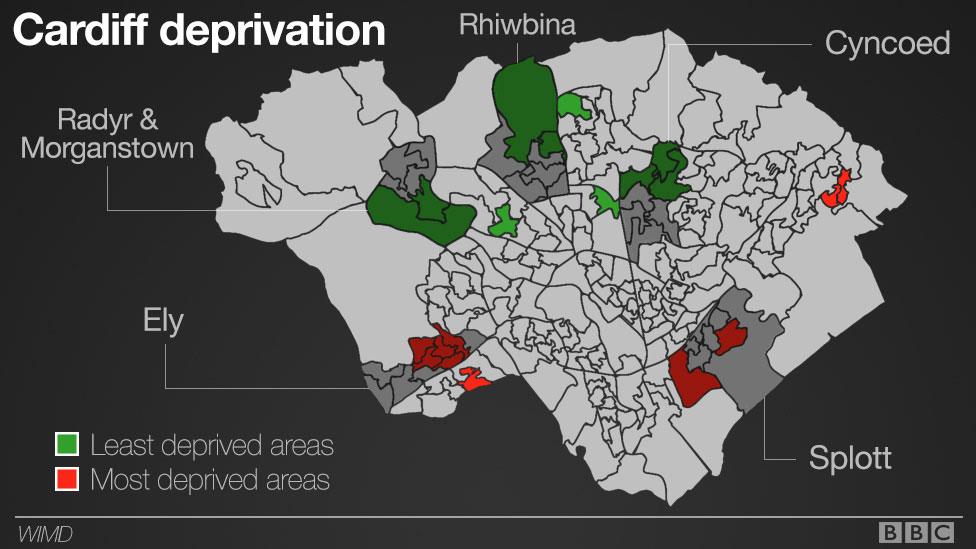
The outlying estate with 6,000 homes on the western edge of Cardiff also has five of the 10 most deprived neighbourhoods in the city, according to the Welsh Index of Multiple Deprivation, external.
One Ely neighbourhood is ranked the second poorest in Wales for income.
Reports of anti-social behaviour are higher than the city average but crime is overall lower than it was a year ago.
It also ranks better for access to services and physical environment.

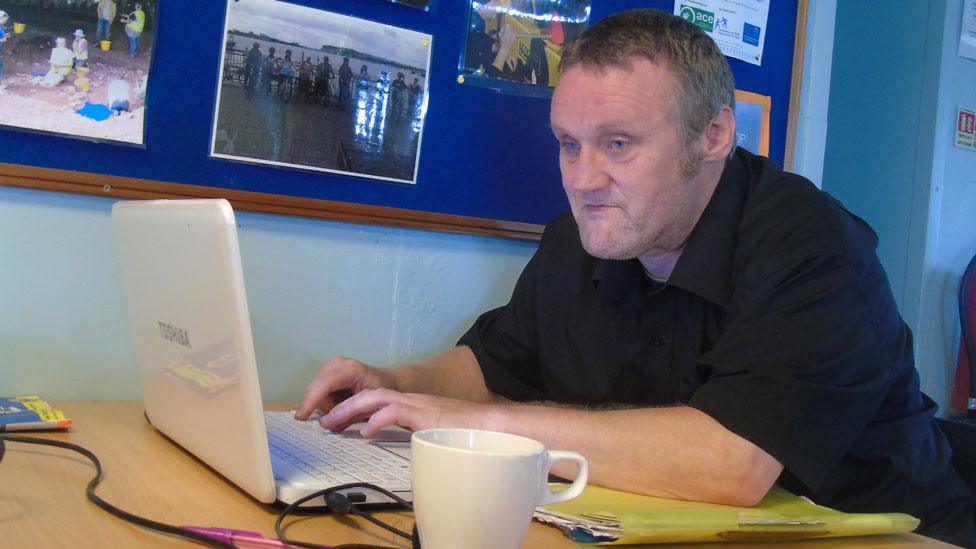
Andrew Way is applying for up to 20 jobs a week
LOOKING FOR A JOB FOR EIGHT YEARS
Andrew Way, 47, has lived in Ely all his life and has been unemployed for eight years since losing a leisure assistant job. He had also done warehouse work.
For the last two and a half years, he has volunteered three days a week for the New Life charity restoring furniture; he's also recently got a qualification in maths to add to a City and Guilds certificate, and will soon start an English course.
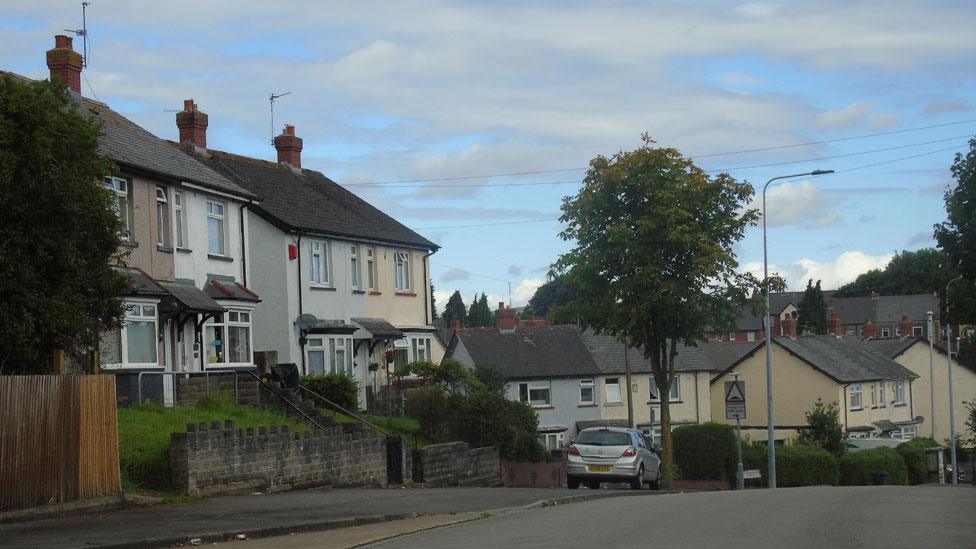
Ely was built from the 1920s
To get job seekers' allowance he has to show he is regularly applying for work and fills in applications online but has not had an interview - or even an acknowledgement.
For those claimants who have been moved onto universal credit, they have to show they are spending up to 37 hours a week applying for jobs or they risk being sanctioned and losing benefits.
"I've gone for warehouse work, barman, cleaning, night porter - maybe I apply for 20 jobs a week," he said. "I check my emails - nothing. It's frustrating sometimes."
There were about six warehouse jobs going in a five mile radius when we check and Andrew said he was happy to travel as far as Newport if he had to. He is applying for cleaning and kitchen assistant jobs too.
"I think it is harder now because all the new rules are brought in. Fair enough they're trying to put people back to work. I just about manage."
He is happy with the support from advisers at his local job centre, who helped him get the voluntary work. But the lack of interviews frustrates him, as does the dearth of any feedback.
Andrew is at the Dusty Forge, a converted pub, which is home to Action in Caerau and Ely (Ace)., external
This provides training, drop-in support, a workshop and computer centre.
The Communities First team there are looking into "up-skilling" Andrew to get over the hurdles and making him more employable, but share his frustration at the system.
"He deserves employment, it's about getting him over the barrier," says training officer Simon Murray.
"The biggest issues are finding credible, contracted jobs paying more than the minimum wage."
Simon, who has worked in Ely for 10 years, said: "There's not enough decent work locally - there are supermarkets and retail, all offering - if you're lucky - eight or 16 hours contracts, predominantly minimum wage. It's cheaper to employ people that way.
"There's no industry within the area, and people can be reluctant to travel. People will get one bus and travel across town. With people coming in here it's about skills and their CVs are a bit light, I think 89% of the local population will not go to university. Our schools are ranked low in terms of achievement. It's a classic scenario."
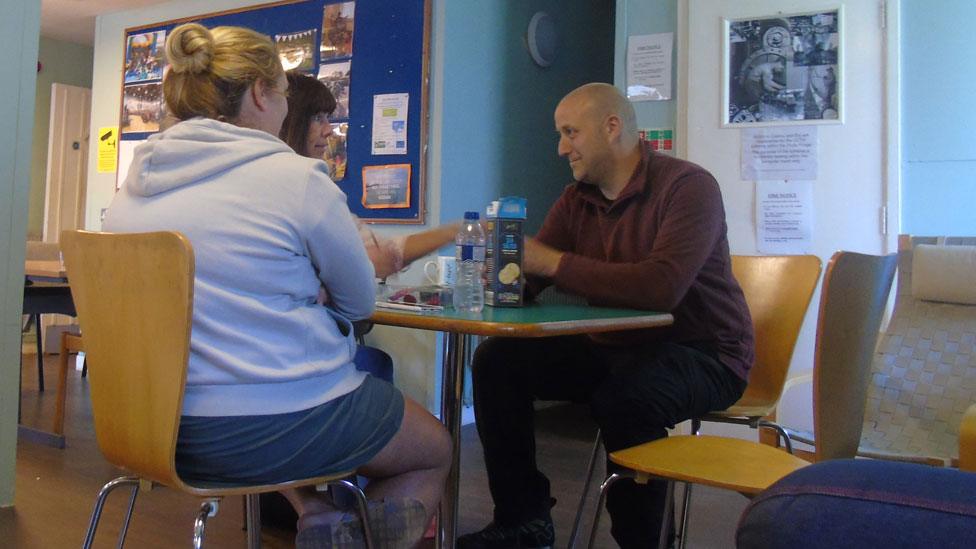
Simon Murray is looking to keep the work done by Communities First going after next year
Simon said: "It's depressing in some capacities but you get little victories along the way. We like the community a lot, when you watch people grow up and do well it's nice to see that.
"It's the perception, perpetuated by programmes like Benefits Street that people are having a good time. They manage, but then you get people who prey on them and get them into debt."
"People come in here in a terrible state, upset, last resort because they've been sanctioned or got mental health issues," said Simon.
"We feel we're seeing more people and can do more for people, but then our remit's changed, we're losing staff. Communities First will be gone by next March. I don't want to just end up being a training organisation - I'd like to do stuff because we can, not because we have to. It's whether we can still deliver a service when we essentially become self-sustaining."

Long gone - the old Labour Exchange
Has it got better with unemployment falling?
"It doesn't feel any better because Trussell Trust will report food banks are continuing to rise," said Simon.
He picks up bread from a friend's bakery in Pontcanna to give out and they are also making their own mobile pizza ovens in the workshop, which are out in the community as part of outreach work, to talk to people about what they can offer.
"It's not necessarily about people being in employment but it's about people being out of poverty - which are two different things."
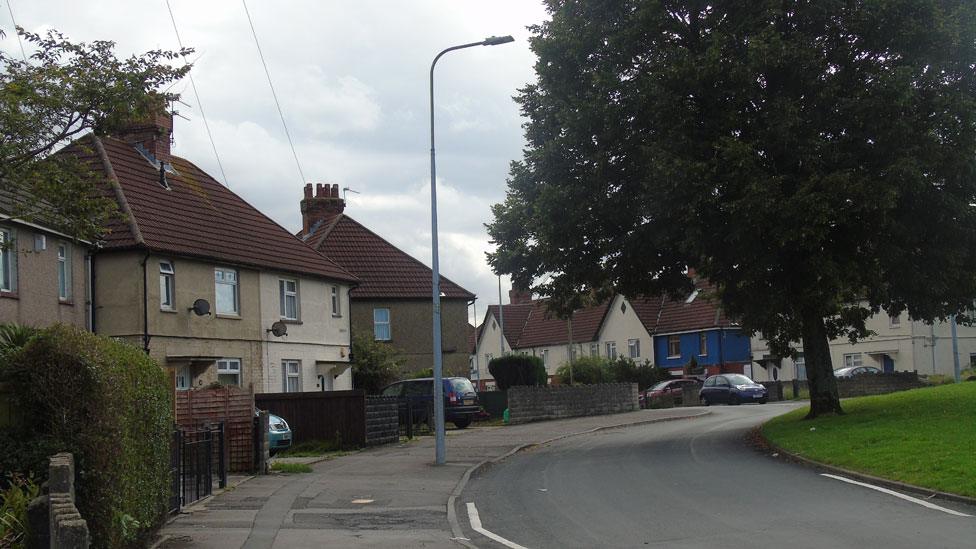
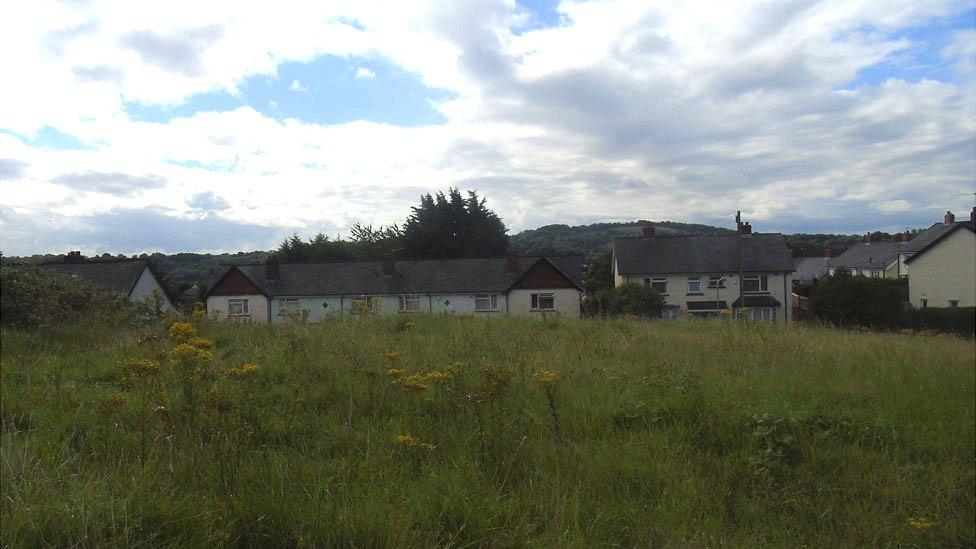

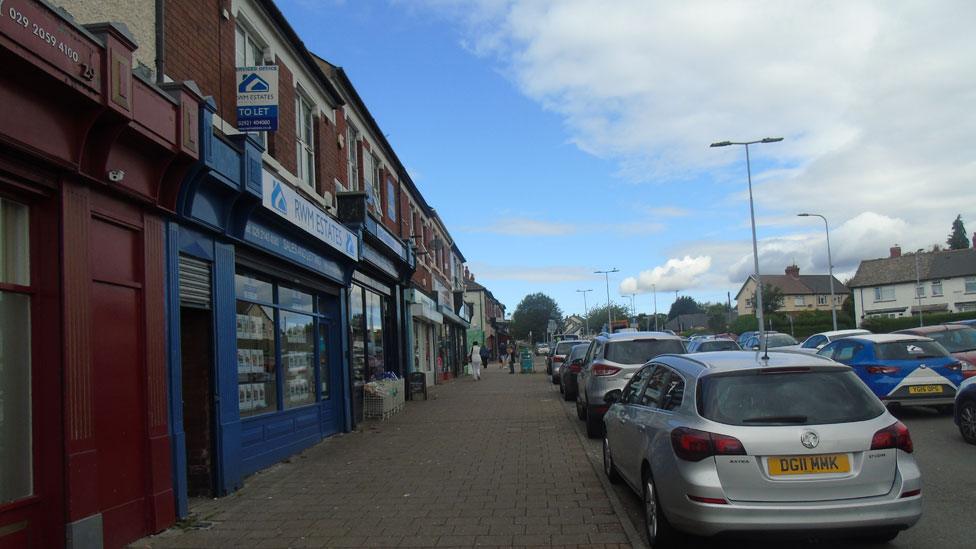
The centre has helped 63 16-to-18-year-olds into work in the last year but the biggest focus is with the over 24s. Ace offers training in basic health and safety - green cards to get people onto construction sites. There is also training to get people into jobs - from security to lifeguards at leisure centres.
Eve, who has childcare and beauty qualifications, has been in and out of work since 2013.
"I have to apply for 30 jobs a week," she said. "It's horrible when you get a knock-back. I think there are so many people applying for one job. It's tough out there. You have to apply online you can't just walk in anywhere."
Lynne, another who did not want to be pictured or her real name used, is in her 30s and has four children. She wants part-time cleaning work around her childcare needs.
She has no qualifications because her first child was born when she was 17. Lynne has been looking to return to work, with her youngest child now in school.
"I'd like to work while they're in school," she said. "It's been hard but I've been on courses at the Dusty Forge and it's given me more independence and confidence to get back into work."
"I apply for 10 jobs a day when I'm online - and you don't get that full response back, it's awful, I thought it was down to my age or experience."
Employment mentor Maisey Edwards said they were dealing with people who had their benefits stopped.
Employment mentor Maisey Edwards, who is trying to help her, said there was a lot of competition for jobs and it was about working on confidence and skills.
"Childcare is a major issue with women, but a few are coming through with no qualifications at all, so we try to get them into training and work on employability skills - whether CV writing, job applications and interview skills - especially those who have been out of work for a while."
There have been modern homes built on the fringes of the old pre-war council housing over the last 20 years but bigger developments are taking place to the south.

The first homes in the £100m 'urban village' The Mill between Ely and Canton are due to open at the end of 2017
The most dramatic is the £100m Ely Mills housing development that will see the site of a former paper mill transformed into an 750-home "urban village."
There is a also a new £36m Cardiff West high school which got the go-ahead on Wednesday and will be built at Trelai Park.
Both of these projects potentially provide job opportunities on the doorstep. Links are already been made with contractors.
But employment is often through agencies, which can also apply to jobs in leisure. Some jobs can also involve cumbersome application processes, even for relatively low level jobs.
"Agency work is in everything - what used to be council work or in health," said Simon. "Trying to do the application for one supermarket chain - even the managers said they can't do it, we tried and we failed - that's for any job there.
"The vast majority will get some work but they'll be back, it's a little bit of work here and there. One of my lads had arrangements and was on his way to work - they texted him to say he wasn't wanted, it's soul destroying."
Gareth Dawe, customer services lead for Job Centre Plus in Cardiff said there were opportunities in retail, care and also with companies like Cardiff Bus that were being taken by people from Ely,
"The expectation is that customers do what they reasonably can to look for work," he said.
"For universal credit customers, the expectation is they're looking for full-time work and that will be a full-time job looking for their job.
"That could be a couple of hours a day looking on a computer, that could be applying for jobs - that can be a couple of hours, it could be contacting employers."
Gareth Dawe, customer services lead for Job Centre Plus in Cardiff said people had to apply for jobs that were right for them
He admitted it was challenging but said people were not being pushed into areas that were not right for them and were being supported in a number of ways.
Mr Dawe said people had to apply in a "constructive way" but those on universal credit tended to find work sooner and stayed in work longer.
Eve is waiting to hear back about four applications, all for minimum wage jobs. She can still hope but adds: "You're going around in circles. It's disheartening."
- Published16 August 2017
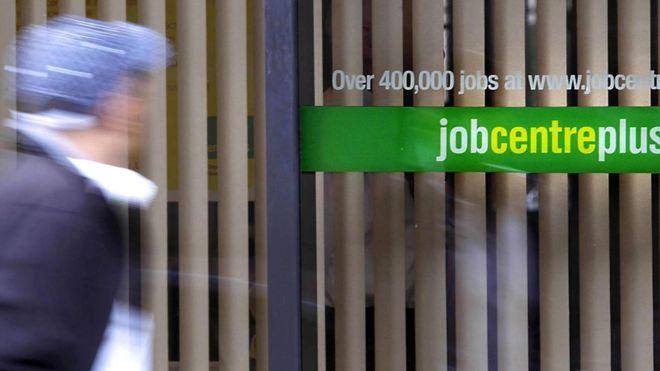
- Published16 August 2017

- Published17 December 2015

- Published6 May 2017
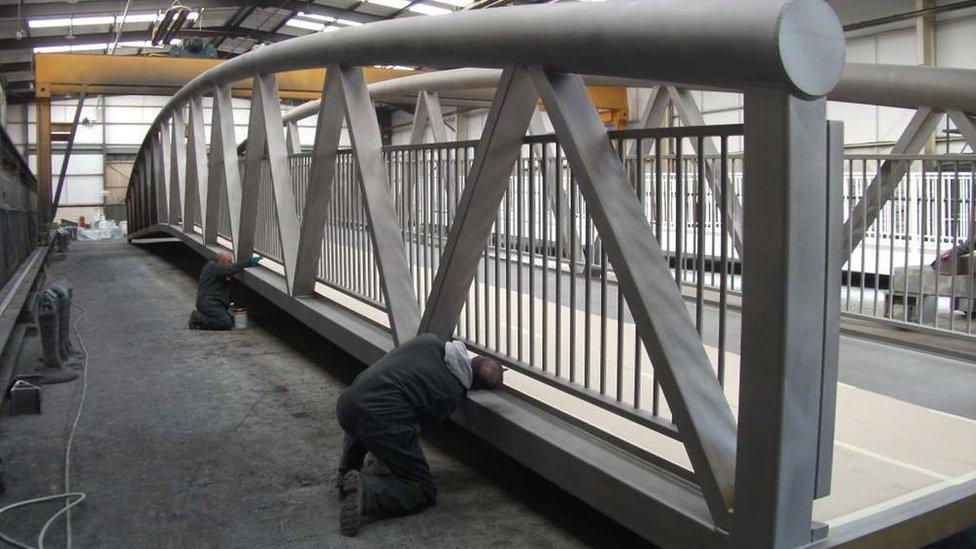
- Published30 August 2016
